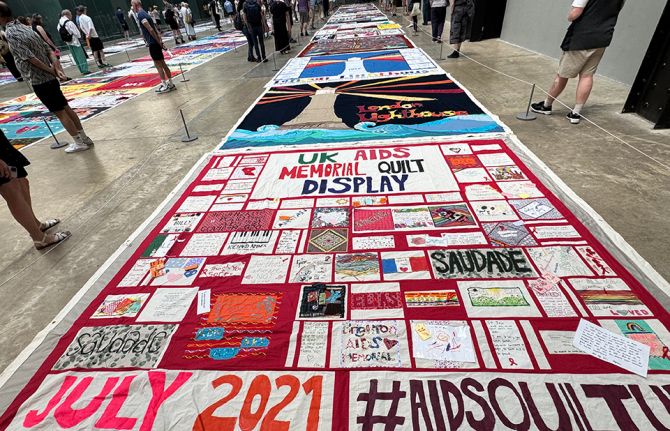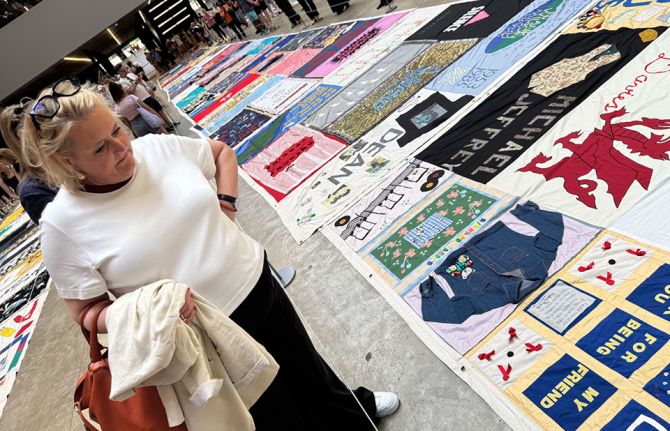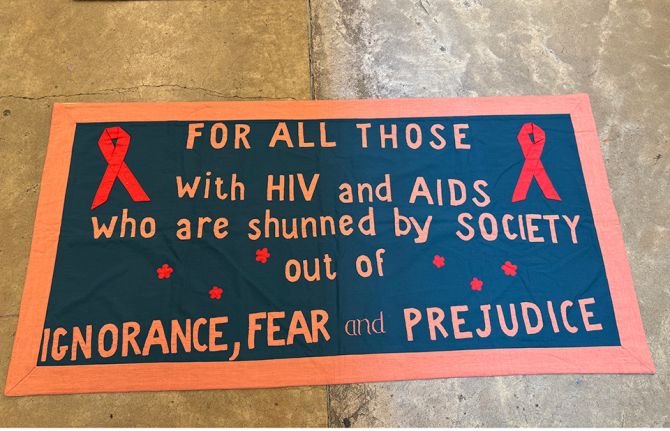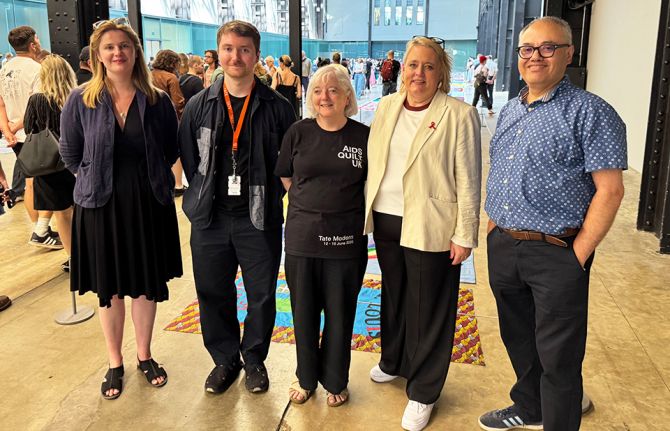





Feature Story
Tate Modern exhibits UK AIDS Quilt, a powerful tribute to people lost to AIDS
26 June 2025
26 June 2025 26 June 2025The Tate Modern art gallery in London paid a powerful tribute to lives lost to AIDS by exhibiting the UK AIDS Memorial Quilt which features hand-stitched panels commemorating people whose lives were cut short by the disease. It is the largest ever showing of the UK Quilt in history.
On Monday 16 June UNAIDS Deputy Executive Director Christine Stegling paid a special visit to the exhibition. “It was beautiful and sombre in equal measures,” Ms Stegling reflected. “I was reminded of the loss we have all experienced. Of the dark times we have come from.”
Created in the 1980s, the UK AIDS Quilt contains 42 panels, each made up of a collection of smaller panels, created by loved ones of those who died of AIDS. The idea of an AIDS memorial quilt started in the United States as a way to commemorate the lives of people who died from AIDS-related causes. It paid tribute to friends and loved ones as sadly, those who died were often not given funerals because either their families rejected them, or funeral homes refused to take their bodies for fear of infection.
Ms Stegling’s visit underscored the importance of remembrance and perseverance, and the need to centre human dignity in public health responses. The exhibition reminds people how far the world has come in the fight against HIV—today, 30 million of the 40 million people living with HIV are on life-saving antiretroviral treatment. However, it also demonstrates profoundly that there is much still to be done to tackle the stigma and discrimination associated with HIV.
Ms Stegling’s visit was part of a broader mission to the UK. In her remarks at the British Group Inter-Parliamentary Union Pride Reception the next day, Ms Stegling warned of the devastating impact of recent funding cuts to foreign assistance, particularly the reductions in US funding and r in UK development assistance which are already undermining progress against AIDS. These cuts included defunding community-led efforts which are critical for reaching all people at risk for and living with HIV.
“Community-led efforts customized to meet the needs of LGBTIQ+ communities were among the first services defunded,” she said, highlighting the disproportionate impact on marginalized groups. UNAIDS estimates that without previous funding levels fully restored, or offset, there could be up to 6.6 million additional new HIV infections and additional 4.2 million AIDS-related deaths.
Despite these challenges, Ms Stegling emphasized the power of communities to drive progress. “Ending AIDS is no longer aspirational—it is achievable,” she told parliamentarians and civil society leaders. She called on the UK to continue its legacy of leadership by investing in equitable access to lifesaving HIV services and by supporting grassroots organizations critical for connecting people to healthcare. “Community leadership, compassion, courage—and solidarity—this is what works,” she said, urging renewed commitment to the 2030 goal of ending AIDS as a public health threat.
Ms Stegling’s UK visit, including her engagement with lawmakers and civil society during Pride Month, served as a poignant reminder that while the fight against AIDS is far from over, it can be with sufficient support for the right approaches. Her presence at the Tate Modern and her powerful advocacy at the parliamentarian reception reaffirm UNAIDS’ call to action: to fund what works, protect those most at risk, and ensure that no one is left behind in the global AIDS response.



